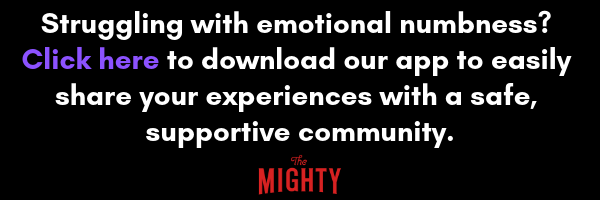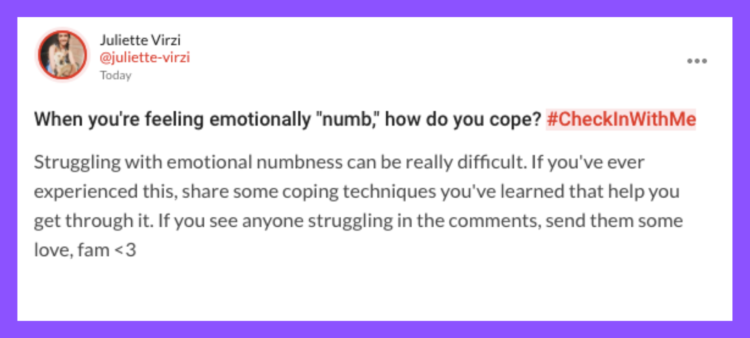If you’ve ever felt “numb” to your emotions, you’re not alone.
Maybe you live with a mental illness like borderline personality disorder (BPD) or PTSD that causes you to dissociate, leaving you out of touch with your body and feelings. Maybe you live with depression and instead of deep sadness, you just feel apathetic and numb. Or maybe your psychiatric medication affects your moods so much that you struggle to feel anything at all.
Whatever your experience may be, we want you to know we understand. We wanted to know what “habits” people who experience emotional numbness have, so we turned to our Mighty community to share their stories. Check out what they said below.
We are so grateful you’re here and in our community. If you’re struggling, we encourage you to post a Thought or Question about it on the site to get support from other people in our community who get it.
Here’s what our community shared with us:
1. “Constant and toxic obsession with checking social media accounts. I completely black out my world and avoid the numbness by scrolling through Facebook for hours on end.” —Nikki K.
2. “It’s like wanting to enjoy something, but always having that slight unease in the pit of your stomach keeping from that happening. I used to call it the ‘pukey feeling’ before I learned about dissociation. Not being able to handle my emotions, shutting them off entirely was the only way to function. But they would turn off in other parts of my life and I just felt nothing. It feels like watching yourself from inside yourself, in a way. You’re watching this machine be piloted and are transfixed by it.” — J. S.
3. “Not making eye contact. [I make] very little conversation, have no tone in my voice and give one-word answers (that’s if you’re lucky, you’ll normally get a random “Hmm”). I’m very quiet and distant. I isolate myself.” — Cheryl D.
4. “I get very restless, and can’t stay in the same place for long. I feel driven to get out, take a drive, go eat out, watch a movie at the theater I didn’t feel like watching — even if I know I don’t have the money for it. I keep doing things so hopefully I can distract myself from the feelings of pointlessness.” — Jacinta M.
5. “Not wanting to engage in conversation and being emotionally distant.” — Katie S.
6. “Binge-watching TV, playing a game on my phone and isolating myself.” — Mo T.
7. “My speaking voice is very monotone when I feel numb. So sometimes when I say things, they sound really bad coming from me because I have no emotion and I just sound irritated when I speak. It makes me feel so bad because I could say something with a positive connotation and it could sound really bad. I just try not to speak when I’m numb.” — Kat C.
8. “In my past, self-injury was a way of feeling something when I was numb. I’m in recovery from self-injury now.” — Heather S.
9. “Saying ‘huh’ when they’re telling me something important. I am listening, but I sometimes can’t process it due to my mind being all over the place.” — Tabitha N.
10. “Silence, I’ve been labeled as the ‘strong, silent type,’ but I’m just dead inside.” — David C.
11. “Smiling. I smile a lot when I’m emotionally numb to fake being OK so no one knows I’m not OK.” — Sarah H.
12. “Getting on my cell phone in a group setting. A few weeks back, I made a new friend and she asked me another time when we all went out as a group, ‘Why do you get on your phone while you’re out?’ I was totally caught off guard, not realizing I had been doing it so much. I actually thought about it and told her when I feel awkward and unsure (unsafe) about the group or conversation, I can hide behind my cell screen…” — Christina W.
13. “Sometimes I trail off in the middle of a sentence because I stopped caring about what I was saying or couldn’t focus on the train of thought for long enough.” — Sarah H.
14. “Isolating myself. Don’t care to go into work or if I do, I don’t talk unless need be.” — Emily F.
15. “I eat. The numbness makes me feel empty and I fill it with comfort food. I either overeat or start snacking without even realizing. My head just tells me to get food and I do it. Next thing I know, I’ve eaten so much junk that I feel physically sick. It isn’t fun at all.” — Ashley M.
16. “Staring. Sometimes it feels as though I become ‘too much’ in a depressing self-aware mode. Also, self-harm might occur too… just to even physically feel something.” — Jeff P.
17. “Keeping a smile on while I’m dying inside just because I don’t want to hurt anyone else.” — Tyler P.
18. “Smoking. I think maybe if I get sick, I’ll be feeling something. But that never happens, no matter how much I smoke.” — Aya F.
19. “I do things because I know I should do them or because it’s expected, not because I want to. Like I used to listen to music before this happened to me and now I don’t like it much, but I listen anyway because I feel that’s what I should be doing.” — Naomi D.
20. “I feel the need to touch everything I see. Fabrics, walls, rocks, paper, toys, animals… anything tactile to try to ground myself. Sometimes if I find something with a good texture, I focus on it so intensely I end up tuning out the outside world and everyone in it.” — Samantha A.
21. “Being blunt. When my emotions have left the room, I don’t gauge how people might be feeling so I say it like it is — only to regret it later.” — Michelle B.
22. “My habit is a hyperfixation on one celebrity and his career/life. I am not a stalker type, but I joke that I follow him so closely on social media that I know when he farts. How sad is that?” — Andrea R.
23. “Going to sleep wayyyy too late, then getting up too late, then napping and repeat.” — Diane K.
When you live with a mental health struggle like BPD, depression, PTSD or another mental illness, feeling numb or apathetic can be common. If feeling emotionally numb has affected your daily functioning, you’re not alone. We are a community of people who understand. If you want to connect with people who have been there, download our free app. If you have coping tips to share with people who are struggling with emotional numbness, answer the Question below.
Can you relate?
Unsplash photo via Darius Bashar



